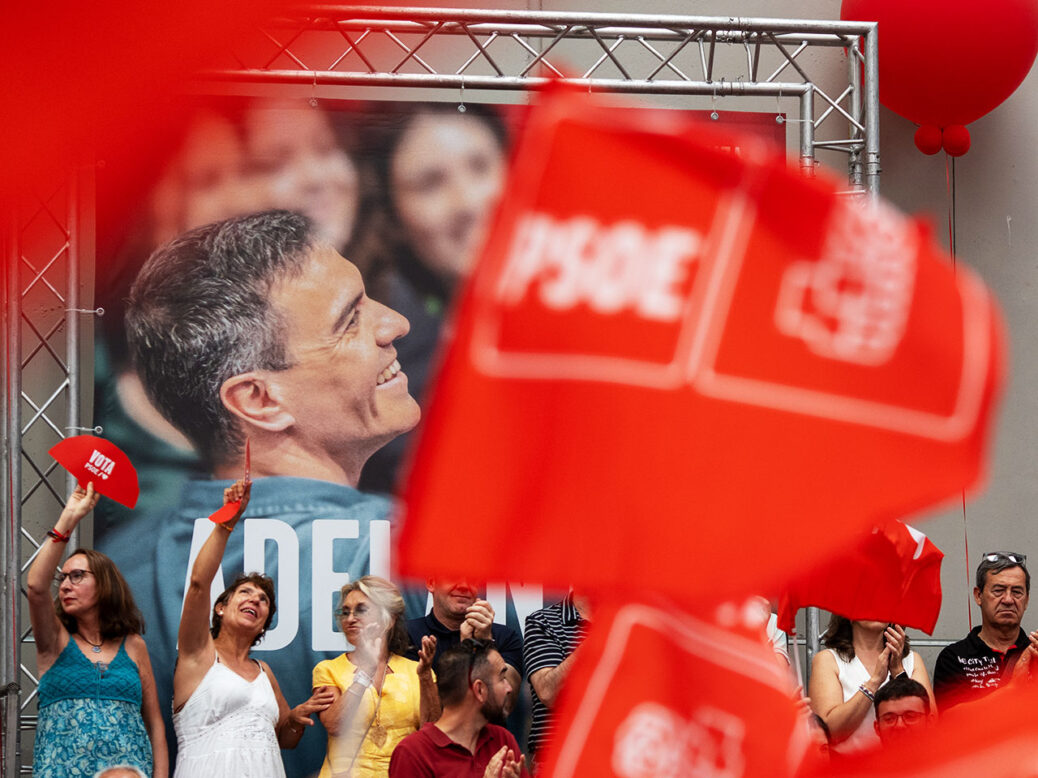
“Spaniards, comrades,” Pedro Sánchez declared outside his Socialist Party’s Madrid HQ on the evening of Sunday 23 July, “there’s many more of us who want Spain to move forward, and we will continue doing so.” Exit polls from the country’s general election had come in and gleeful supporters chanted “no pasarán”, celebrating the prime minister’s success in stopping the conservative Partido Popular (PP) and the far-right Vox.
Yet while Sánchez suggested he had “many more” supporters than his right-wing opponents, he didn’t win outright. Alberto Núñez Feijóo’s PP secured 33 per cent of the vote to the Socialists’ 32 per cent, and fourteen more MPs. Yet this was a weaker showing for the right than expected, and Feijóo lacks a majority even with Vox’s help.
Potential post-election alliances were a primary focus in the lead-up to the election. Sánchez’s Socialists had governed since 2020 together with radical-left forces, but the results of May’s municipal elections were dismal for the left. After those votes, Feijóo’s PP formed various local-level coalitions with Vox, even where – as in the Extremadura region, west of Madrid – they had earlier ruled out this possibility. It was against this backdrop that Sánchez took the gamble of calling a snap election, asking Spain if it really wanted a PP-Vox government.
The prospect of Vox entering national government, even as a junior partner, helped Sánchez to draw sharp dividing lines: would Spain be “on the side of Biden or Trump… Lula or Bolsonaro”? As these international comparisons implied, Sánchez’s coalition government itself combines different kinds of left-wing politics, particularly given the inclusion of the labour minister Yolanda Díaz’s Sumar platform. Uniting the left-populist Podemos, Communists, and smaller allies, Sumar took 12 per cent (a near tie with Vox).
While Sánchez used the far-right threat to mobilise his base, the PP did little to counter this narrative. Not only had Feijóo made regional-level pacts with Vox without meaningful conditions, but he skipped the televised debate on 19 July – thus leaving Santiago Abascal, the leader of Vox, as the sole representative of the right. Sánchez took the chance to label Vox a “flat earther” party of climate change deniers – just as Spain was experiencing a deadly heatwave – and hammered its plans to cancel legislation on gender-based violence.
Sánchez’s warnings that a PP-Vox government would reverse his governments’ achievements – including a guaranteed minimum income, an energy-price cap and improved employment rights – encouraged his supporters to the polls. Overall turnout reached 70 per cent, despite the unusual summer election. On 24 July, the day after the election, Sánchez and Díaz insisted that they could form another government, though with only 153 of 350 seats they will need to find other allies.
While the opposed left- and right-wing blocs took similar vote shares, the PP-Vox pairing has a lead in seat numbers: 169, seven short of the 176 needed to govern. Yet they will be much harder for them to find allies among the many regionalist forces in parliament. While the Basque Nationalist Party has made deals with the PP before, it is unlikely to ally with the far right. Meanwhile, Vox proposes to ban the other major Basque party, EH Bildu, because of the former members of the separatist organisation ETA in its ranks. Ironically, the parties of Catalan independence, whose own vote share fell steeply, are the more likely kingmakers. The Catalan Republican Left will probably support Sánchez in exchange for spending promises; the separatist Junts is more intransigent but may be convinced to abstain in a confidence vote and let Sánchez continue.
King Felipe will probably ask Feijóo to try to form a government first – with the risk of repeat elections if neither he nor Sánchez can scrabble together a majority. Yet a second vote in the autumn could also look rather different. As Feijóo responded to his bloc’s disappointing results, he was interrupted by PP members chanting the name of a potential alternative leader – Isabel Díaz Ayuso, president of the Madrid region, often called a “Spanish Trump”. They think she would steer the PP toward more hardline positions, enabling the party to eat up Vox’s vote and energise the right-wing base. Yet the election result proves there are still just as many Spaniards determined to stand against the far-right. Whether those in the centre are willing to heed that lesson is still unclear.
[See also: The forward march of Europe’s far-right halted]



